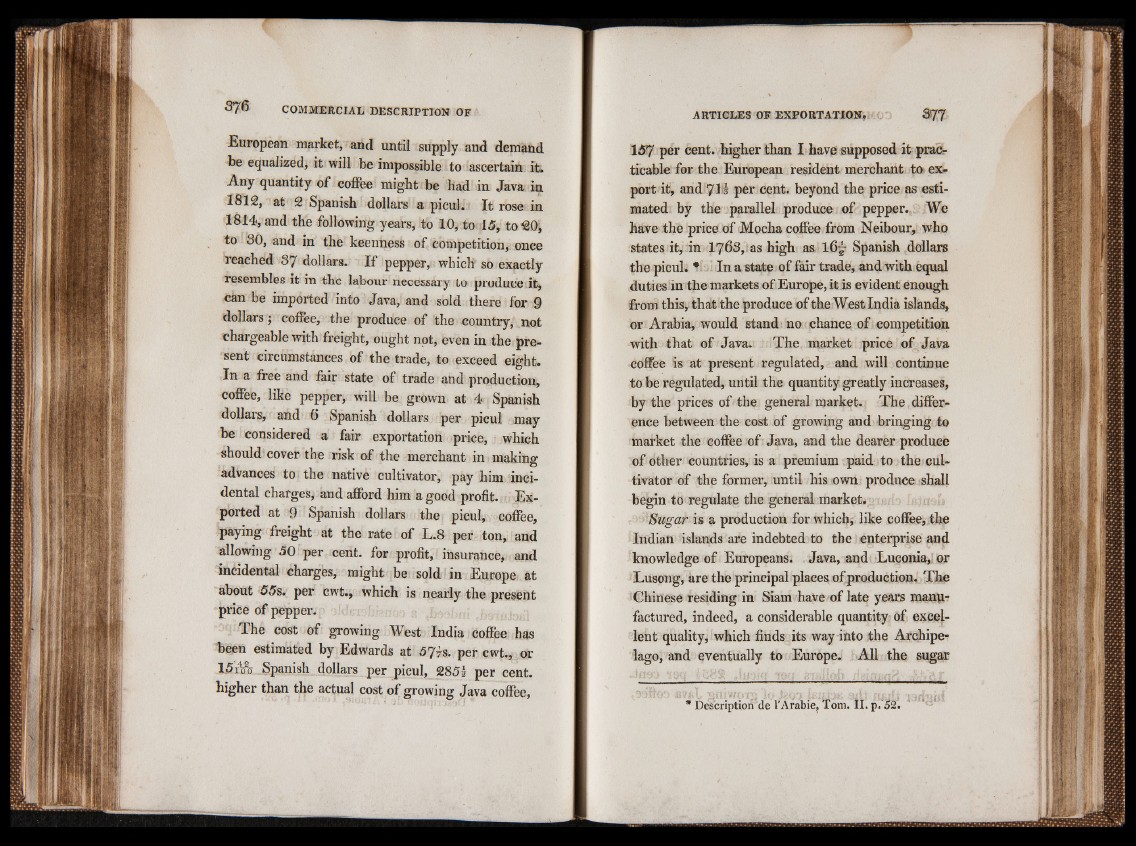
European market, and until supply and demand
be equalized, it will be impossible to ascertain it.
Any quantity of coffee might be had in Java in
1812, at 2 Spanish dollars a picul. It rose in
1814, and the following years, to 10, to IS , to 2 0,
to 30, and in the keenness of competition, once
reached 37 dollars. If pepper, which so exactly
resembles it in the labour necessary to produce it,
can be imported into Java, and sold there for 9
dollars; coffee, the produce of the country, not
chargeable with freight, ought not, even in the present
circumstances of the trade, to exceed eight.
In a free and fair state of trade and production,
coffee, like pepper, will be grown at 4 Spanish
dollars, and 6 Spanish dollars per picul may
be considered a fair exportation price, which
should cover the risk of the merchant in making
advances to the native cultivator, pay him incidental
charges, and afford him a good profit. Exported
at 9 Spanish dollars the picul, coffee,
paying freight at the rate of L.8 per ton, and
allowing 5 0 per cent, for profit, insurance, and
incidental charges, might be sold in Europe at
about 55s. per cwt., which is nearly the present
price of pepper.
The cost of growing West India coffee has
been estimated by Edwards at 57fs. per cwt., or
1.5roo- Spanish dollars per picul, 2851 per cent,
higher than the actual cost of growing Java coffee,
157 per cent, higher than I have supposed it practicable
for the European resident merchant to export
it, and 7H per cent, beyond the price as estimated
by the parallel produce of pepper. We
have the price of Mocha coffee from Neibour, who
states it, in 1763, as high as 16^* Spanish dollars
the picul. * In a state of fair trade, and with equal
duties in the markets of Europe, it is evident enough
from this, that the produce of the West India islands,
or Arabia, would stand no chance of competition
with that of Java; The market price of Java
coffee is at present regulated, and will continue
to be regulated, until the quantity greatly increases,
by the prices of the general market. The difference
between the cost of growing and bringing to
market the coffee of Java, and the dearer produce
of other countries, is a premium paid to the cultivator
of the former, until his own produce shall
begin to regulate the general market.
Sugar is a production for which, like coffee, the
Indian islands are indebted to the enterprise and
knowledge of Europeans. Java, and Luconia, or
Lusong, are the principal places of production. The
Chinese residing in Siam have of late years manufactured,
indeed, a considerable quantity of excellent
quality, which finds its way into the Archipelago,
and eventually to Europe. All the sugar
* Description de l’Arabie, Tom. II. p752*